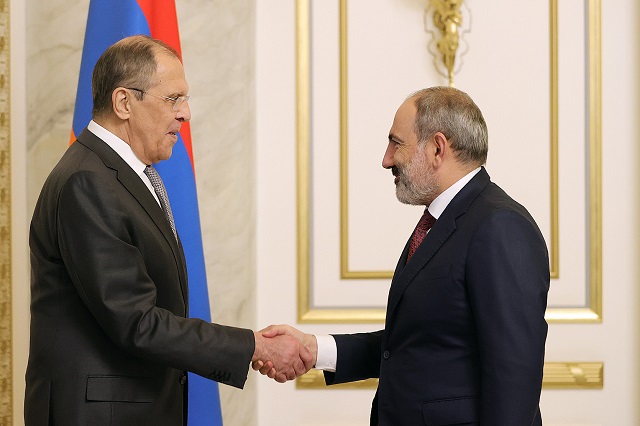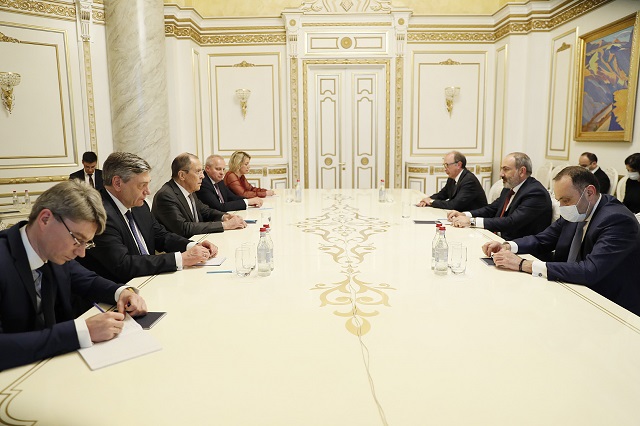Acting Prime Minister Nikol Pashinyan received a delegation led by RF Foreign Minister Sergey Lavrov.
Greeting the guests, Nikol Pashinyan said:
“Dear Sergey Viktorovich,
Dear Colleagues,
I am delighted to welcome you to the Government of Armenia. The relations between our countries are of allied nature; they are structured around the principle of strategic partnership and underpinned by our peoples’ fraternal relations.
It is my pleasure to emphasize that our bilateral relations have become even stronger in recent months as they stood another test of viability.
Read also
At this difficult time for Armenia, the Russian Federation reached out to help us solve the problems that had emerged due to the global pandemic and Azerbaijan’s aggression against Karabakh. Thanks to Russia’s efforts, we managed to halt the hostilities and achieve a tangible reduction in regional tensions. The presence of Russian peacekeepers in Nagorno-Karabakh is a powerful pledge of security in Nagorno-Karabakh.
I wish to make special mention of the role played by the President of the Russian Federation, Vladimir Putin, in reinstating peace in the region, as well as for his efforts to provide favorable conditions for the functioning of Nagorno-Karabakh. In this regard, I would like to assure you that Armenia will continue to take all necessary measures to implement the agreements reached through the trilateral statements of November 9, 2020 and January 11, 2021.
We are also ready to make every effort to foster a constructive dialogue between the parties on a tripartite scale. However, I must say that Azerbaijan’s demarches may jeopardize the ongoing dialogue. I mean Baku’s actions aimed at manipulating the clause of return of prisoners of war, fomenting Armenophobia, setting forth territorial claims to Armenia, destroying the cultural and religious heritage of the Armenian people, which tend to escalate the regional situation and break the tripartite agreements.
In this context, I would like to note with satisfaction the steps taken by the OSCE Minsk Group Co-Chairs, whose latest statement came as a strong response to Azerbaijan’s non-constructive stance. The Co-Chairs’ position, as reflected in the April 13 statement, goes in tune with Armenia’s approaches to today’s primary challenges. In this context, I would like to reaffirm our position that the peace process needs to be resumed in order to reach a final settlement of the Nagorno-Karabakh conflict, based on the principles proposed by the Co-Chairs.
Sergey Viktorivich,
I once again welcome you to Armenia, I am confident that we will have constructive and effective talks.”
RF Foreign Minister Sergey Lavrov said:
“Dear Nikol Vovayevich, thank you very much. Since the very first moment of our visit to Yerevan, we have felt the warm attitude of our friends, the Armenian people. Thank you for the attention you are personally paying to our delegation.
Amid our developing contacts with you, today we held in-depth, substantive and confidence-based talks on all issues of bilateral relations, on regional issues and on cooperation in international organizations. We reaffirmed the particular importance of our allied ties and strategic partnership in all areas of interaction.
You have been engaged in extensive political dialogue with the President of the Russian Federation even in this pandemic year. You had detailed conversations twice during meetings held in Moscow and talked over the phone many times. President Putin conveys to you his warmest wishes of success in your efforts to develop your country and implement the agreements reached on the Nagorno-Karabakh settlement.
Next year marks 30 years of our diplomatic relations, and 25 years of the basic and fundamental Treaty of Friendship, Cooperation and Mutual Assistance. This is a key document, which defines our relations for many years ahead and is being consistently implemented in all areas of mutual interest – economy, political ties, military and military-technical cooperation.
We are committed to ensuring the security of our ally, the Republic of Armenia. This was discussed during your contacts with President Putin, and as part of regular interaction between our defense agencies. There can be no doubt about this either.
We appreciate the agreements on the Nagorno-Karabakh settlement. We are grateful to you for noting the role played by Russia and President Putin personally in halting the hostilities and establishing a sustainable framework for further action by all sides.
We strongly support the activities of the Trilateral Working Group at the level of Deputy Prime Ministers of Russia, Armenia and Azerbaijan, who are engaged in important and perhaps the most significant at this stage issues of unblocking economic and transport communications, which will make it possible to end the blockade of Armenia and ensure mutually beneficial interaction of all countries in the region for the common benefit in practice (not only at the political level, as this has already been done).
Of course, our peacekeeping contingent will continue its efforts in Nagorno-Karabakh. The Trilateral Agreement determines the peacekeepers’ powers in terms of ensuring the security of the people of Nagorno-Karabakh and the functioning of the Lachin corridor.
Our peacekeepers will do their best to resolve the remaining issues related to determining the exact line of contact, achieving mutually beneficial agreements on its passage. Delimitation, demarcation of the border between Armenia and Azerbaijan will be possible as soon as all these steps are implemented.
Together with the other OSCE Minsk Group Co-Chairs, we continue to advocate for the resolution of humanitarian issues, including the repatriation of persons held in detention. We understand the symbolic and emotional significance of this step.
We are confident that we will be able to resolve this problem in the near future. This will create a positive, constructive atmosphere for moving forward on all issues leading to a final settlement. We will help you address these problems in all formats by implementing the trilateral statements.
We will in every possible way stimulate the activities of the OSCE Minsk Group Co-Chairs in order to build the most favorable atmosphere conducive to the settlement of the remaining issues.
Thank you again for the opportunity to be hosted by you. I am convinced that the results of today’s talks held at the Foreign Ministry and with you will help us advance our allied relations in all areas. Thank you.”
The interlocutors discussed issues related to the current agenda and the prospects of the Armenian-Russian allied relations, to the situation around Nagorno-Karabakh and the settlement of humanitarian issues. The sides discussed the steps to take in the directions specified by the Acting Prime Minister of the Republic of Armenia and the Minister of Foreign Affairs of the Russian Federation.
Nikol Pashinyan drew Sergey Lavrov’s attention to Azerbaijan’s continued anti-Armenian rhetoric, and in this context, referred to the so-called Trophy Park, recently opened in Baku, which features Armenian-phobic exhibits. Pashinyan called unacceptable the participation of children and schoolchildren in this process.
The Russian Foreign Minister stressed the importance of joint efforts towards creating a constructive atmosphere and dialogue in the region. Sergey Lavrov described the talks held with his Armenian counterpart as quite effective and shared his impressions of today’s visit to the Armenian Genocide Memorial, stressing that Russia will always stand by the friendly Armenian people.
The sides exchanged views on the regional situation and security challenges.
INFORMATION AND PUBLIC RELATIONS DEPARTMENT OF THE OFFICE OF THE PRIME-MINISTER OF THE REPUBLIC OF ARMENIA




















































